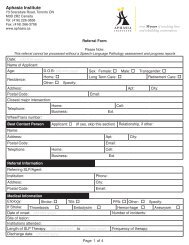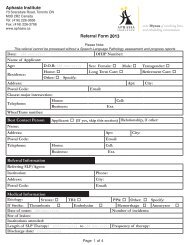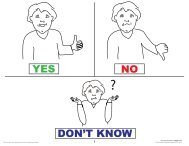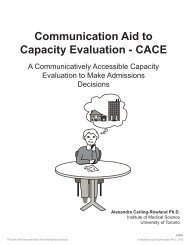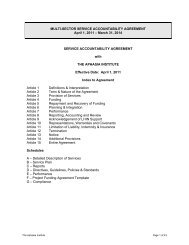SLP Survey Report_Final - Aphasia Institute
SLP Survey Report_Final - Aphasia Institute
SLP Survey Report_Final - Aphasia Institute
You also want an ePaper? Increase the reach of your titles
YUMPU automatically turns print PDFs into web optimized ePapers that Google loves.
Training/Education<br />
• Training re evidence-based programs;<br />
• With More <strong>SLP</strong>s to discuss evidence-based practices with Professional Development days<br />
at work that focus solely on discussing up-to-date EVP<br />
• Increased access to continuing education specifically related to aphasia - even through<br />
telehealth so as to limit some of the travel costs<br />
• More time/ resources willingness of physicians to learn more about aphasia better access to<br />
high intensity therapy programs availability of communication assistants availability of<br />
volunteers<br />
• Time to review evidence Access the time of team members to educate them Opportunity to<br />
demonstrate the effect of BPG to team members Prepared material to present to team<br />
members More <strong>SLP</strong> resources (FTE)<br />
• More education TIME to attend conferences<br />
• More opportunities to teach other health-care professionals about aphasia<br />
• Time access to standardized testing material education of staff members access to journal<br />
articles time for continuing education<br />
• Reading and discussing journal articles with peers<br />
• Strong practice guidelines for across the continuum supported by stroke networks Better<br />
education of physicians, esp. neurosurgeons, re: benefits of aphasia intervention<br />
• National outcome measure for <strong>SLP</strong> in Canada (like ASHA NOMS in USA) to provide<br />
better support for intervention Better public awareness of aphasia<br />
• Time for evidence-based education time for looking at evidence<br />
• Need frequent ongoing educational opportunities to highlight EBP<br />
• Continuing Education; Educational Resources; Therapy Materials; Access to Support;<br />
Interdisciplinary Team<br />
• Easily accessible articles (e.g. available in one publication or on one website) 3. physician<br />
education re: importance of aphasia education, assessment and treatment<br />
• Better preparation in university<br />
• Access to training EBP<br />
• Resources to attend workshops more time to read the literature more frequent access to<br />
friends / family more regular access to functional settings more time to carry out<br />
interdisciplinary meetings with patients and family<br />
• Review of literature removing studies with inadequate amounts of treatment to determine<br />
Tx strategies which were helpful rather than debating whether aphasia therapy is beneficial<br />
or not.<br />
• Being an inpt therapist I usually don't complete IADL assessments. A tool to guide<br />
evaluation of same would be beneficial.<br />
• Development of extensive speech/language restorative software (i.e., similar to bungalow)<br />
available in iPad rather than desktop to provide more intensity.<br />
• I attended a train-the-trainer session by <strong>Aphasia</strong> <strong>Institute</strong> a few years ago. I found it<br />
helpful. Similar programs offered in other geographic locations would be beneficial.<br />
• Our grad students having access to recent best practice guidelines as they provide most of<br />
our direct care<br />
<br />
45



